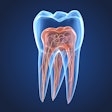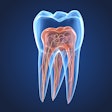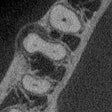
Patients with certain characteristics are more likely to experience severe pain after root canal therapy, according to a new study in the Journal of Dental Research. Practitioners may be able to use these pretreatment predictors to better recommend pain management strategies for their patients at risk for severe postoperative pain.
The study evaluated a variety of factors that may influence pain after root canal therapy (RCT). The authors found four factors that significantly predicted severe postoperative pain:
- Diagnosis of symptomatic apical periodontitis
- Intensity of pretreatment pain
- Pain made worse by stress
- Number of days pain kept the patient from their usual activities
"Practitioners could use this information to better inform patients about RCT outcomes and possibly use different treatment strategies to manage their patients," the study authors wrote (J Dent Res, March 2015, Vol. 94:3 suppl, pp. 37S-43S).
The researchers evaluated 708 patients who underwent root canal therapy through the National Dental Practice-Based Research Network. They collected data about the patients immediately before and after treatment, measuring 12 categories of various dental and nondental factors. These included the patients' sex, age, type of tooth undergoing treatment, and diagnoses of various dental diseases.
“Practitioners could use this information to better inform patients about their possibility of developing postoperative pain ... and use different pain management strategies.”
The participants were from three countries and eight U.S. states. The majority of participants were white (90.6%) and women (58.6%) who were 47.8 years old on average.
Seven days after surgery, the patients were asked to rate the worst pain they experienced post-treatment within the week on a scale of 1 to 10, with 1 meaning no pain and 10 meaning the absolute worst pain possible. The researchers considered the postoperative pain to be severe if the patient's rating was 7 or greater.
After performing a multivariable logistic regression analysis on the data, the researchers found that almost 20% of patients experienced severe postoperative pain, more than similar studies on the topic. The study authors attributed this to the self-reporting nature of their study. In other studies, patients would have to call their practitioner to report pain or swelling.
Only four of the 12 categories the researchers evaluated significantly predicted postoperative pain: a diagnosis of symptomatic apical periodontitis, intensity of pretreatment pain, pain made worse by stress, and pain keeping patients from their usual activities.
Symptomatic apical periodontitis and pain
A diagnosis of symptomatic apical periodontitis was the only dental disease to make the short list. The other diseases the researchers looked at, including asymptomatic apical periodontitis, proved to not significantly predict severe pain.
"We found that the presence of an apical radiolucency alone did not predict severe post-treatment pain, providing further support that the symptom of pain associated with symptomatic apical periodontitis is the most important component of the predictor," the study authors wrote.
Previous studies that have looked at apical periodontitis as risk factors for postoperative pain have mixed results about how significantly the disease impacts post-treatment pain. The researchers believe that this may be because those studies included both asymptomatic and symptomatic apical periodontitis in their findings, whereas this study separated the two.
Other predictors of severe pain
The researchers also found that the intensity of preoperative pain impacted the intensity of postoperative pain. For each baseline increase in the intensity of pain pretreatment, they found a 15% increase in the risk of developing severe pain after treatment. Other studies have had similar findings, indicating that it may be one of the more important pain predictors, the researchers noted.
Furthermore, this was the first study to evaluate whether pain made worse by stress and pain keeping patients from their usual activities were predictors of postoperative pain, making it more noteworthy that both factors were found to be linked to intense post-treatment pain.
Patients who noted that their pain is made worse by stress were 2.5 times more likely to develop intense postoperative pain. Also, there was a 32% increase in the risk of severe postoperative pain for each day that pain kept the patient from their usual activities.
Practical application for general dentists and endodontists
The study authors hope that future clinical trials will evaluate how to preemptively prevent pain in patients who exhibit these four predictors for severe postoperative pain. However, dentists and endodontists can already take steps to help patients who exhibit the predictors.
"Given that information on these factors could be collected preoperatively, practitioners could use this information to better inform patients about their possibility of developing postoperative pain in the days following treatment and use different pain management strategies for patients more likely to experience severe pain," they wrote.
Most notably, the authors encourage practitioners to discuss the possibility of severe postoperative pain with patients who have a higher intensity of preoperative pain.
"This ... factor is an important predictor of severe post-treatment pain and should be considered when discussing treatment outcomes with patients," they concluded.



















